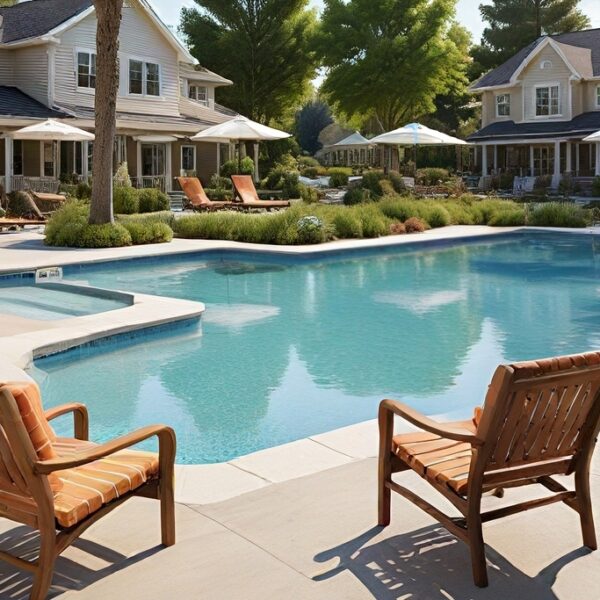Retirement Villages in France: A Guide for Expats and Retirees
France, renowned for its rich culture, scenic landscapes, and exceptional healthcare system, has become a favored destination for retirees, particularly those from the UK, the US, and other European countries. Retirement villages, or résidences pour retraités , offer an ideal living solution for seniors looking to enjoy their golden years in a peaceful, supportive, and community-oriented environment. In this article, we explore the various retirement villages across France, their features, and what makes them an attractive option for retirees.

Why Choose France for Retirement?
Before diving into the specifics of retirement villages in France, it’s important to understand why France is a top choice for retirement:
1. Quality of Life
- Healthcare : France boasts one of the best healthcare systems in the world, with affordable medical services available to residents.
- Climate : The climate varies from region to region, but areas like the French Riviera and Provence offer mild winters and warm summers, which are ideal for retirees.
- Culture : Rich in history, art, and food, France offers an unparalleled lifestyle that retirees can enjoy, whether through leisurely strolls in Paris or sampling world-class wines in Bordeaux.
2. Financial Benefits
- France has a favorable tax regime for retirees, particularly for foreign nationals who qualify for the country’s special tax provisions.
- Property prices can be more affordable in rural areas compared to other parts of Europe, making it easier for retirees to buy or rent a home.
What Are Retirement Villages?
Retirement villages in France are residential communities specifically designed for seniors who are independent or require varying levels of care. These villages are typically equipped with modern amenities, such as medical care, leisure activities, and social events, to ensure that residents can maintain a high quality of life while enjoying their retirement.
Key Features of Retirement Villages in France
- Independent Living : Most retirement villages cater to independent living, offering seniors their own private apartments or houses, with access to shared facilities such as gardens, lounges, and restaurants.
- Care Services : Some retirement villages provide additional support services, such as in-home care, physiotherapy, or assistance with daily activities for those with greater care needs.
- Community Focus : These villages often foster a strong sense of community, with social activities like arts and crafts, fitness classes, outings, and even excursions to nearby attractions.
- Safety and Security : Retirement villages are typically secure environments with monitored access points, emergency call systems, and on-site staff to ensure the safety of all residents.
Top Regions in France for Retirement Villages
The best retirement village for you depends on your personal preferences, lifestyle, and healthcare needs. Below are some of the most popular regions in France for retirement villages:
1. Provence-Alpes-Côte d’Azur
Known for its sunny weather, lavender fields, and Mediterranean beaches, this region is a dream for retirees. Cities like Nice , Marseille , and Aix-en-Provence are home to several retirement communities that offer both luxury and tranquility.
2. Brittany
If you prefer a more temperate climate and a slower pace of life, Brittany, located in the northwest of France, is ideal. Cities like Rennes and Quimper have a large expat community and offer affordable housing options in peaceful surroundings.
3. Normandy
Known for its lush countryside and historical sites, Normandy is an attractive choice for those who enjoy nature and history. Caen and Rouen have well-established retirement villages, and the region’s proximity to the UK makes it ideal for British retirees.
4. Aquitaine
Home to the world-famous Bordeaux wine region, Aquitaine offers a relaxed lifestyle with plenty of cultural and natural attractions. The region is known for its vineyards, coastal beauty, and moderate climate, all of which appeal to retirees looking for a mix of outdoor activities and tranquility.
Comparing Retirement Villages in France
The following table provides a snapshot of various retirement villages across different regions in France. These options vary in terms of services, cost, and facilities available.
| Retirement Village Name | Region | Level of Care Provided | Monthly Cost (EUR) | Amenities | Target Audience |
|---|---|---|---|---|---|
| Les Villages d’Or | Provence-Alpes-Côte d’Azur | Independent living, some medical assistance | €1,500–€3,000 | Swimming pool, fitness center, garden, on-site doctor, social activities, excursions | Active retirees, couples |
| Domaine de la Sainte Baume | Provence-Alpes-Côte d’Azur | Assisted living, memory care | €2,000–€4,000 | Luxury apartments, nursing care, spa, communal dining, cultural activities | Seniors with care needs |
| Les Hameaux de l’Étang | Normandy | Independent living, light care | €1,200–€2,500 | On-site restaurant, library, communal gardens, medical check-ups, transportation | Retirees who enjoy nature |
| Les Jardins d’Arcadie | Brittany | Independent living | €1,500–€2,800 | Wellness center, pet-friendly, cultural outings, restaurant, support for mobility issues | Independent retirees with some support needs |
| Résidence Les Sénioriales | Aquitaine | Independent living | €1,000–€2,200 | Swimming pool, wellness programs, restaurant, organized activities, proximity to the beach | Active, independent seniors |
| Les Senioriales de Toulouse | Occitanie | Independent living, nursing care | €1,700–€3,000 | Garden, healthcare services, transportation, weekly social events, dining room | Active retirees, those needing some support |
Cost of Living in Retirement Villages
The cost of living in a retirement village in France varies depending on the type of accommodation and level of care required. The following factors influence the price:
- Location : Cities like Paris or Nice tend to have higher costs, while rural regions such as Brittany or Normandy may offer more affordable options.
- Accommodation Type : Apartments or villas in prestigious villages may come at a premium, while simpler shared accommodations are typically less expensive.
- Care Level : If you require assisted living or medical care, expect higher fees compared to independent living situations.
On average, monthly fees for retirement villages range from €1,200 to €4,000. The cost often includes basic services like meals, housekeeping, and maintenance, but additional services like personal care, medical visits, or specialized therapies may incur extra charges.
Things to Consider Before Moving to a Retirement Village in France
1. Language Barrier
While many retirement villages have staff who speak English, it’s helpful to have some understanding of French to better integrate into the community and handle administrative tasks.
2. Healthcare Access
France offers excellent healthcare, but retirees should ensure they have proper health insurance or are eligible for the French public healthcare system (or complementary private insurance) to cover any medical costs.
3. Legalities and Residency
Non-EU citizens need to navigate visa and residency requirements before making a move. EU citizens, however, have fewer barriers to settling in France.
4. Social Integration
Consider your own social preferences and whether you are comfortable with the French culture and community dynamics. Many villages encourage social interaction, but it’s essential to choose a place that suits your lifestyle.
Retirement villages in France offer a rich and fulfilling lifestyle for seniors, providing a perfect balance between independence and support. Whether you prefer a sunny Mediterranean village or a peaceful countryside retreat, France has an abundance of options that cater to diverse needs and budgets. It’s important to carefully research different regions and villages to find the one that aligns with your expectations, ensuring a comfortable and enjoyable retirement.





